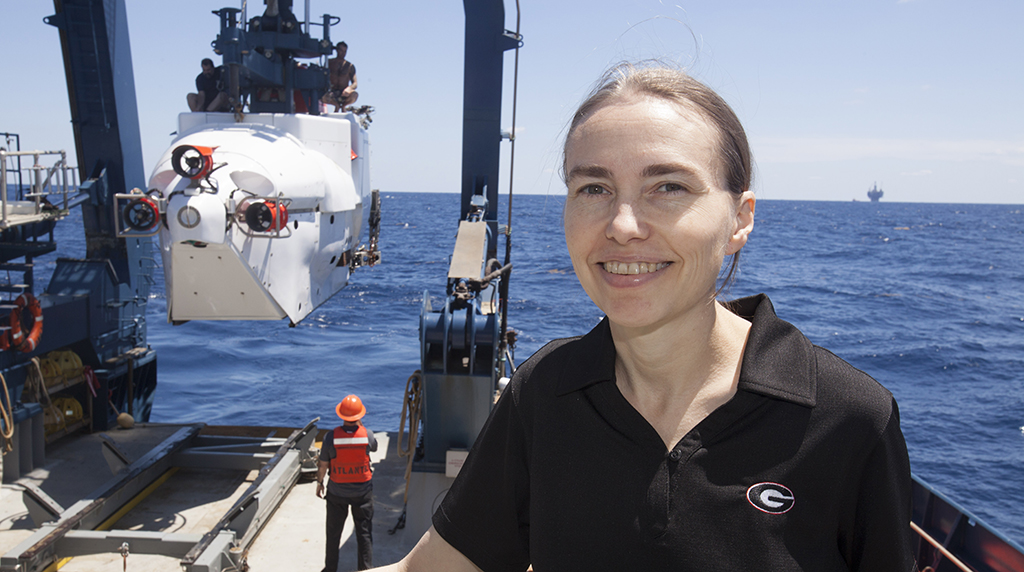August 07, 2015
In the spring of 2010, the Deepwater Horizon drilling platform exploded, initiating an uncontrolled deep-water oil and gas blowout from the Macondo wellhead. The uncontrolled hydrocarbon discharge continued for 85 days and the environmental impacts were substantial.
According to Dr. Samantha Joye (UGA), one of the biggest challenges in evaluating the environmental impacts of the Macondo blowout was the lack of baseline data—both in the water column and along the seabed, where as much as 15 percent of the discharged oil ended up.
As oil and natural gas drilling continues at depths well beyond that of where the Macondo wellhead—at 1,500 meters—blew out, Joye argues in a new article in the journal Science that environmental monitoring data is desperately needed to establish natural baselines; such baselines are essential for documenting anthropogenic perturbations, such as oil spills, and preparing for future disaster response.
In Science's Perspective section, Joye emphasizes that only through collecting both baseline data and consistent long-term observations after perturbations is it possible to piece together the environmental impacts of environmental disasters like oil spills.
Joye stresses that the academic community, federal responders and the oil and gas industry need to take steps to collect baseline data in preparation for future perturbations to this and other ecosystems impacted by offshore hydrocarbon extraction. Such data will establish critical environmental baselines against which natural variations will become evident and will help determine the impacts of a hydrocarbon discharge.
"Baseline data describes natural environmental variation that results from long- and short-term changes in climate," said Joye, the Athletic Association Professor in Arts and Sciences in the Franklin College of Arts and Sciences. "Without baseline data for a system, we live in an ‘invisible present,'" a term coined by John Magnuson in 1990.
Key baseline data in the oceans, she continued, should include documentation of biological communities and natural patterns of biological processes in the water column and along the sea floor. Such baselines should include the natural ability of microbial communities to respond to perturbations, such as massive oil and gas inputs, catalog patterns of nutrient and particle dynamics, and identify factors that regulate biological and physical processes in the system.
She would start gathering this key data in the Gulf and the Arctic—"now," she said. "Baselines take years to establish."
Joye went on to explain what is needed in the Gulf, specifically.
"The Gulf is physically complex," she said, "so to get started I would divide the systems into eight to 10 regions impacted by deep water drilling that span different depths and physical regimes. The monitoring programs would need to be spatially and temporally appropriate—for example, capture seasonal variability—to provide the requisite data."
The ECOGIG, or Ecosystem Impacts of Oil and Gas Inputs to the Gulf, research program, which Joye leads, is collecting data at natural seeps as well as at control sites where there is no natural seepage. However, they are only able to do significant baseline collections once a year because ship time is very expensive, so "we do not have a handle on seasonality, and we very much need that," she said.
Given the critical importance of baseline environmental data, such data should be collected cooperatively and funded by industry as part of "the cost of doing business," Joye said.
"In my opinion," she continued, "industry should support long-term monitoring programs in collaboration with the Bureau of Ocean Energy Management and the National Oceanic and Atmospheric Administration and academic partners to foster a cooperative atmosphere and to establish effective working relationships that assure collection and dissemination of high quality data both before and during well control incidents."
The Science Perspectives article, titled "Deepwater Horizon, 5 years on" is available online here.
To read more coverage on this paper, please visit the following news articles:
Lack of Baseline Data Challenge Evaluation of Environmental Impacts of 2010 Deepwater Horizon Blowout
Oil-spill expert calls for more baseline oceans data on industry dime
UGA marine scientist calls for increased baseline data collection in oceans
For more information on UGA's marine sciences department, visit www.marsci.uga.edu.
This news piece was written by Stephanie Shupska at University of Georgia, Public Affairs. The original article can be found here.


















 back to top
back to top